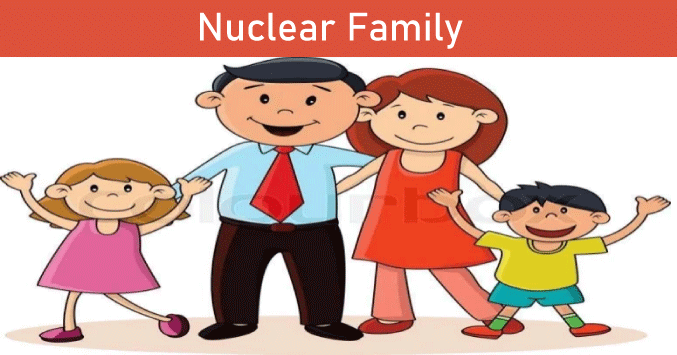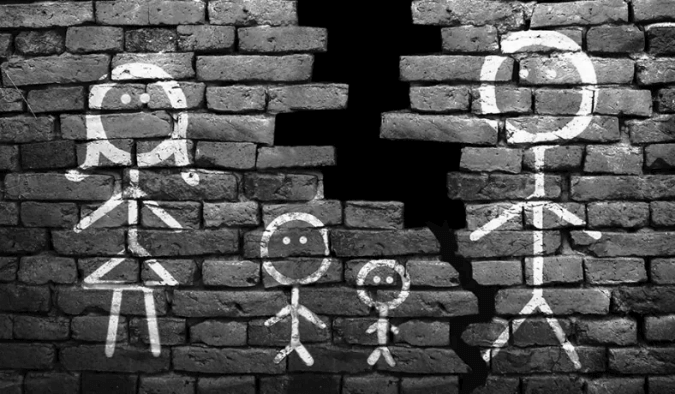Advantages and Disadvantages of Nuclear FamilyDefinition of Nuclear Family:A widespread societal phenomenon is the monogamous nuclear family. The husband, wife, and their unmarried children make up a nuclear family. Once they get married, the children leave their parent's homes and start their households. So, a nuclear family consists of an independent unit that is not governed by the elders. The nuclear family is mostly independent because of the physical distance that exists between parents and their married children. One typical illustration of a nuclear family is the modern family. 

Advantages of Nuclear Family:Strength and Stability: Compared to children born through cohabitation, children born from marriage tend to be more stable. 20% of children with married parents experienced divorce, compared to over 50% of children from cohabiting couples, according to a research institute. Compared to children born to lone mothers, these two kinds of youngsters have a better probability of growing up with a married couple one day. Devoted partners or spouses offer their children a caring, supportive, and loving environment. When children learn how to form good relationships and interact politely with others, this leads to future success. Children observe couples working together to solve issues, delegate household tasks, and support one another in both positive and unfavorable situations. More opportunities result from financial stability: The majority of nuclear families have enough financial stability to give their kids options and conveniences in addition to a safe environment. According to Pew Research Center, 57% of married-parent homes were comfortably over the poverty line, compared to 21% of sole-parent households. Kids in nuclear households may be able to take gymnastics, music, dancing, or other classes, especially if both partners have jobs that require travel. Such opportunities increase a child's likelihood of academic and social success. 
Consistency Implies Successful Behavior: A functional nuclear family provides children with constancy in parental care. Children who experience regularity and stability in their life are more likely to perform positively, do well in school, and engage more deeply in extracurricular and community activities. A nuclear family may frequently eat meals together, go to church, and take family vacations, strengthening ties and providing the groundwork for future aspirations. Education Advancement: Parents who have completed college are more likely to send their kids to college and see them through. One study found that parents with higher levels of education have fewer divorces and more financial resources to support their children. Pew Research Center reports that parents with degrees are more likely to find employment, raising the family income level in nuclear, educated homes. The value placed on education along with higher income levels improves children's prospects for intellectual growth. Benefits to Health: A general study found that children who are raised by married, biological parents had better emotional, social, and physical hygiene than other kids. This is so because married parents are less prone to maltreat their kids. Nuclear families are also more likely to use shelters for the homeless and to have the resources to give their kids access to quality medical care. Youngsters with 2 parents who live in a calm home experience far less emotional stress than children with 1 parent or several caretakers. Interaction Techniques: In a nuclear family, family interaction has fewer hindrances and diversions. Technology advancements have sped up communication for these families away from home. According to research from the Pew Internet and American Life Project, nuclear families are the most likely to use cell phones and the internet. This makes it possible for parents to monitor their kids' online behavior more efficiently and engage in online activities with them. Children who own cell phones can stay in touch with their parents in case of emergencies or changes in plans. Autonomy: Being able to make independent judgments is a big advantage of a nuclear family structure. The young couple might wish to personalize their home's interior to reflect their likes. Additionally, autonomy is offered in terms of daily activities including visiting, eating, going on outings, and socializing. Live Creatively: The new pair has the chance to find novel methods to spend their life because of the nuclear family. Within their family, they have the chance to build their rituals, traditions, and value systems. They might skillfully combine the traditions of their respective families to create a novel, sophisticated civilization. Disadvantages of Nuclear FamilyAway from the Extended Family: The nuclear family unit offers close family members a strong opportunity for connection. A smaller family allows for more specialized care for partners and children, which fosters relationships that last a lifetime. But according to one analysis, a nuclear family entity has the power to isolate members of other families and associations. In trying times, this breakdown of the extended family entity won't be helpful. Grandparents, uncles, aunts, and cousins all have a place in the family structure, even though these relationships aren't always easy to form in a nuclear family. Burnout: Moms have the propensity to become exhausted when attempting to meet everyone's needs. The emphasis placed so heavily on children can leave parents with little time or energy to take care of themselves. Parents may be forced to quit their jobs to care for sick children if extended family members are unavailable to help. Stress, anxiety, sadness, and other problems are brought on by the difficulty of balancing the demands of family, career, and relationships without aid from outside sources. 
Conflict Resolution Techniques: One benefit of a nuclear family is that there is less conflict and family strife, but the family is also at a disadvantage. Life is filled with conflict, and having the skills to deal with it is useful in the classroom, business, and society. Nuclear families might develop thought patterns along similar lines, resulting in fewer conflicts within the family unit. However, it can cause issues for representatives of the extended family. Families can explore alternative viewpoints and learn how to handle exterior disagreements and opinions by looking at how their extended family members think and feel. Little System of Support: Small nuclear families may experience emergencies such as accidents or illnesses. On the contrary, extended family structures provide built-in support for such circumstances. In a nuclear family where both parents are employed and have young children, it is not always possible to be able to meet all goals and desires by yourself with the family entity. There is assistance available in multigenerational homes. Increase in Stereotypes: Stereotypes about single moms, cultural family structures, and family structures based on religion around the world are exacerbated by the emphasis on the nuclear family as the best practice. It has been hypothesized that nuclear families have not traditionally been as common as first thought. This idea symbolizes a goal that should be sought after by everyone while people in various circumstances may object. This standardized objective has an impact on public services and policies that may ignore different sorts of families. Sense of Self-Centeredness: According to Concordia University, the typical nuclear family is child-oriented. This suggests that the focus is on the nearby family, particularly the kids. The family structure works to meet its requirements while giving others less priority. This idea could encourage children to have selfish tendencies and thinking. Additionally, it could result in a small-minded worldview that gives society's overall health only passing attention. Favored Family Structure: Most people want to raise their children in a nuclear family, although the number of solo parents separated, and multigenerational households are growing. Although it cannot guarantee pleasure or success, the decision to start a family as a nuclear unit can provide a foundation for achieving those goals. Although no family is perfect, by collaborating with family representatives, the greatest possible outcome for all parties involved is guaranteed. 
Loss of Culture and Values: Every joint family structure transmits the tradition of long-standing family values. As people transition to nuclear families, these fundamental characteristics are gone somewhere. Despite all of its flaws, the nuclear family is still considered to be the best type of family. It is the most popular choice for raising children. Even though it can't guarantee success, it gives a person the independence and strength they need to find their paths to happiness and success. However, you can find strategies to decrease them by being conscious of the inherent drawbacks. In the end, no family is perfect. However, sharing a home with the entire family ensures the best outcomes for everyone. The Conclusion:Living in a nuclear family has advantages and disadvantages. However, you and your partner will have the last say. The nuclear family is considered the ideal way to raise children. Although there is no assurance, it will at least help you become strong and independent.
Next TopicAdvantages and Disadvantages of ERP
|
 For Videos Join Our Youtube Channel: Join Now
For Videos Join Our Youtube Channel: Join Now
Feedback
- Send your Feedback to [email protected]
Help Others, Please Share










